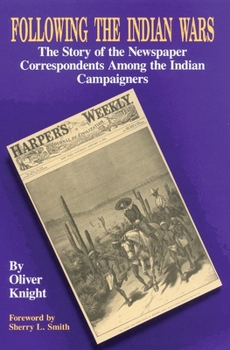Following the Indian Wars: The Story of the Newspaper Correspondents Among the Indian Campaigners
Select Format
Select Condition 
Book Overview
Historians and military men have had their say about the Indian wars, which lasted from 1866 to 1891. But the newspaper correspondents who took to the field with troops now get their innings--if not the last word. And what they have to say, as revealed by Oliver Knight, himself a former newspaperman, sheds new and important light on twenty-five years of conflict extending over half a continent. Using a huge canvas, the author deploys the...
Format:Paperback
Language:English
ISBN:080612508X
ISBN13:9780806125084
Release Date:March 1993
Publisher:University of Oklahoma Press
Length:382 Pages
Weight:0.70 lbs.
Dimensions:1.1" x 6.0" x 9.1"
Customer Reviews
1 rating
Journalists at work
Published by Thriftbooks.com User , 19 years ago
This is the most interesting book I've read about the work of newspaper correspondents in the field. While focusing on a handful of campaigns against the Indians in the West mainly during the 1860s-1870s, Knight traces the role of the assigned correspondents who marched with the soldiers, sometimes fought (and died) with them, and somehow wrote the stories and got them back to their respective newspapers under trying conditions. Although Knight deals with 12 major campaigns between 1866-1891, he centers his attention on chiefly the following: Crook's campaign against the Paiute in Oregon (1867-68), reported by Joe Wasson of the "Owyhee Avalanche" of Silver City, Idaho; Custer's attack at the Washita in the winter of 1868, with reporter DeBenneville Keim of the "New York Herald" in tow; The Modoc War along the California-Oregon border in 1873, attended by a number of reporters, chief among them Edward Fox of the "New York Herald" who interviewed "Captain Jack," the Modoc leader; Crook fighting the Sioux at the Rosebud in 1876, covered by reporters from Chicago, Denver, and New York; and Custer again at the Little Big Horn, where Mark Kellogg, claimed by two newspapers, became a hero after being killed along with Custer's men. Although Knight of course is mainly interested in the newspapermen and what they wrote and how they delivered their stories, he also gives a pretty detailed account of the events being covered. His writing is clear and concise, and he shows how newspaper stories of those times were much different than today: many of them were written in the form of letters to the editor, the writer's own prejudices were usually allowed to stand, and often the writer employed a droll sense of humor in his accounts. At the end of the book Knight traces the life of his newspaper "heroes" beyond the times covered in the book to the conclusion of their careers. It's an interesting and entertaining book. Knight concludes his work by saying that the newspapermen did their jobs well. So does he. Highly recommended.





